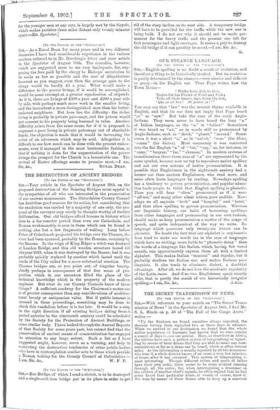OUR STRANGE LANGUAGE.
[To TUE EDITOR OF TUN " SP liCTATOR."J Sin,—English spelling is uo doubt a result of evolution, and therefore a thing to be historically studied. But its evolution is partly determined by the changes—very elusive and difficult to grasp—in the English ear. Thus Pope writes how the
Town Mouse-
" Walks from dish to dish,
Tastes for his Friend of Fowl and Fish ; Tells all their names, lays down the law, Que ca est boa ! Ah goutes ca!
You may say that " law " was the nearest rhyme available in English, and that its use does not imply that Pope heard "fa" as "saw." But take the case of the early Anglo- Indians. They seem never to have heard the long " a" of Indian languages, as the " a" in " father." Sometimes it was heard as "aw," as in words still so pronounced by Anglo-Indians, such as " dawk," " gbaut," "manna." Some- times it was a short "o," as in "nabob," "toss" (for khds), "conna" (for !Marta). Most commonly it was converted into the flat English "a " of " bat," " cap," as, for instance, in "anna," "banyan," "lac," " chumun." In modern systems of transliteration these three uses of " a" are represented by the same symbol, because now we try to reproduce native spelling and not our own notions of native pronunciation. It is possible that Englishmen in the eighteenth century had a keener ear than modern Englishmen, who read more, and more often learn languages by reading. Nowadays spelling has a tendency to govern pronunciation, and popular educa- tion leads people to think that English spelling is phonetic. Thus you will hear "often" pronounced as if it were " off-ten," and many other silent letters grow audible. Now- adays we all aspirate " herb " and " hospital " and " hotel," and thus allow spelling to govern pronunciation. Whereas our linguistic history, our habit of borrowing spellings from other languages and pronouncing in our own fashion, should make us keep pronunciation a matter of the usage of speech, and quite independent of the way we write. No language which possesses only twenty-six letters can be phonetic. No doubt the fact that our• alphabet is unphonetic does tend to make our words (as in the case of languages which have no writing) more liable to " phonetic decay " than the words of a language like Italian, which, having few vowel sounds, can approximately express them all with a limited alphabet. This makes Italian "musical" and regular, but it probably deadens the Italian ear, and makes Italians poor• linguists. It also tends to eliminate dialect, a doubtful advantage. After all, we do not love the academic regularity of the Latin races. And if no two Englishmen speak exactly alike, that is partly the result of our• historically irregular






































 Previous page
Previous page